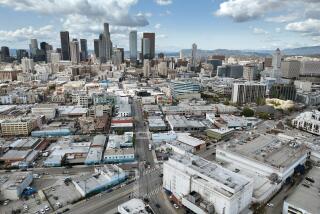Critics Make Expansion of Fashion Plaza a Hard Sale, Supporters Say
After a firestorm of criticism over the last two weeks, backers of a just-approved $122-million expansion of the Fashion Plaza shopping mall in West Covina agree that it was a hard sale.
Although other Redevelopment Agency projects have been controversial, none has rivaled the revitalization plan for Fashion Plaza, which was built in 1975. The project’s terms, for which the city has pledged more than $100 million in future sales and property taxes to the developers, were even criticized by the Los Angeles County grand jury.
An overflow crowd of nearly 300 people packed the council chambers recently for the vote at a joint City Council-Redevelopment Agency meeting. More than six hours later, about 100 who remained saw the council approve the agreement, with only Councilman William Tarozzi in opposition.
3 Months of Negotiations
“I think there was more than the usual community interest in the project,” said Mayor Robert L. Bacon, who joined council members Richard Lewis, Bradley J. McFadden and Nancy Manners in voting for the agreement.
The fight leading up to the vote pitted most of the city’s elected officials, the Chamber of Commerce, and a number of prominent merchants and citizens against a group of residents fearful that developers were getting too much.
The agreement ends three months of negotiations between the city, mall owner Sylvan S. Shulman and developer May Centers that continued until hours before the meeting. May Centers, a subsidiary of St. Louis-based May Department Stores, will build a new store at Fashion Plaza as part of the expansion.
Eastland Face Lift
Backers of the deal said it will ensure the continued financial health of the city’s largest sales-tax generator. At the same time, they argue, the city’s other major retail mall, Eastland Shopping Center, will receive a long overdue face lift as part of the deal.
May Centers owns the aging Eastland center, which is about 30 years old, and has agreed to a $3.5-million exterior rehabilitation of Eastland as a first step toward revitalizing the older mall. The May Co. store will move from Eastland to Fashion Plaza, and the vacant store will eventually be subdivided for smaller retailers.
“Contrary to what some people are saying, contrary to what the grand jury reports, this has not been fly-by-night,” Manners said in explaining her vote. “We can find things to pick on. It’s not perfect . . . but we have to look at the total picture.”
That picture, according to redevelopment officials, indicates that Fashion Plaza customers are going to malls in Arcadia, Industry and Montclair. Without the expansion, the city would lose part of the nearly $1.2 million it receives in annual sales tax revenues.
Decline in Sales
According to city studies, Fashion Plaza experienced a 7% decline in sales and a 19% drop in customer traffic in 1987-88.
Critics of the deal argue that the city gave away too much and did not receive enough in return.
Although May Centers has committed to redoing Eastland’s exterior, there is no timetable for when the developer must undertake a full-fledged mall rehabilitation. Without such a commitment for Eastland, Tarozzi said, he could not support the city giving away $100 million in future tax revenue.
But Dale H. Levander, one of two economic consultants who advised the city to pursue the agreement, told the council that this was the best offer it could expect. Although the grand jury urged the city to negotiate a better deal, Levander said none would be forthcoming.
Low Return
Levander said the 12.5% return that Shulman-May Centers is slated to receive on its $77.5-million investment is low considering the scope of the project. Redevelopment officials estimate that the developers are not expected to begin making profits until the year 2000.
The agreement calls for the additions in the next two years of a 140,000-square-foot May Co. store, 100,000 square feet of new mall space and up to 82,000 square feet of small shops near the plaza. The plaza now has 1 million square feet of mall space.
A large portion of the existing mall will be rehabilitated, including adding a restaurant area and skylights, and upgrading the entrance and interior. The proposal calls for the city to acquire, possibly through condemnation, 26 acres of developed land east of the mall.
Under the agreement, the city will rebate to the developers all the new property tax revenues created by the expansion over the next 30 years. For the first 15 years, the city will give 85% of the new sales taxes created by the expansion and 70% for the next 15 years.
The city will receive an estimated $35 million in new revenue over that time, city officials said.
In financing the project, the agency will issue up to $45 million in tax-exempt bonds to acquire and clear the land, relocate existing businesses and install public improvements. The developers will have to pay off the bonds, which will be secured by the mall property. The city will own the parking structure to be built as part of the expansion.
More to Read
Sign up for Essential California
The most important California stories and recommendations in your inbox every morning.
You may occasionally receive promotional content from the Los Angeles Times.










